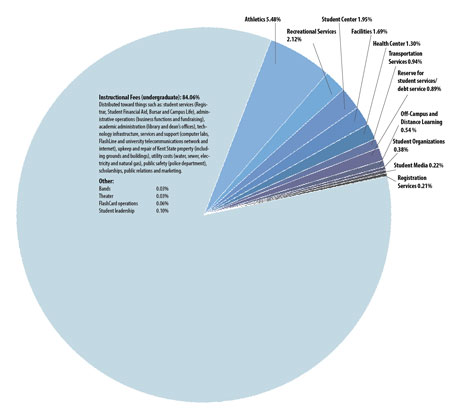What tuition pays for: tuition and fees 101

If you’re going into thousands of dollars of debt, it’s best to know what you’re paying for.
Kent State’s tuition will rise 1.5 percent for the 2013-2014 school year — the first time in the last few years that the Board of Trustees has not permitted the maximum increase allowed by state law.
The money raised by the increase in tuition will be funneled into financial aid, officials say.
Tuition now stocks in at $4,908 for an in-state, full-time student, not including course fees or room and board.
Also keep in mind that this is the second year of Kent State’s controversial credit-hour fee, which charges students taking more than 16 credits hours an extra $447 per credit hour.
Tuition is divided into two categories: instructional and general fees.
Instructional fees cover teaching costs and academic expenses while general fees go to student services and operations.
— DKS staff
Departmental uses for funding
FLASHcard Operations – The cost of students’ FLASHcards and maintenance of the FLASHcard equipment.
Athletics – Operational costs. It also allows students to enjoy free admission to home regular season sporting events.
Off-Campus and Distance Learning – Operating expenses, allowing the university to offer students a convenient way to take coursework with much more flexibility to serve students’ needs.
Student Organizations – Covers operating expenses and provides programs for students through the Center for Student Involvement. This includes funding for student organizations and guest speakers and concerts on campus.
Theater – Provides for the operating expenses for the university’s theaters.
Registration Services – Provides for the operating expenses of the Registrar’s office. It also provides services such as academic records maintenance, academic scheduling services, athletic eligibility, determination of Ohio residency for tuition purposes, diploma processing enrollment and registration, enrollment certification, grades processing, name changes for current students, schedule of classses, third-party enrollment reporting and transcript services.
Bands – Marching band expenses.
Student Leadership – Provides funding for student leadership positions in student organizations.
Student Media – Provides funding for student media publications, such as the Daily Kent Stater, The Burr, KentWired, Black Squirrel Radio, Uhuru, Fusion and TV2.
Transportation Services – Pays for the provision of PARTA’s on-campus bus services.
Facilities – Facility repairs or improvements. It’s also used to pay debt on bonds issued in previous years.
Health Center – Allows students to receive quality medical care from experiences, board-certified physicians and nurse practitioners. Services that students may use include treatment for acute illnesses, minor injuries, women’s health care and an on-site pharmacy.
Recreation Services – Operational costs and upkeep of the Student Recreation and Wellness Center. Students enrolled in five credits or more are automatically granted access to the center, where they can take advantage of three floors of fitness, wellness and relaxation.
Student Center – Provides operational costs, including heating, cooling, ventilation and electricity. Students can also reserve rooms in the Student Center for free.
Additional student fees
Program and course fees – These fees provide special materials used in classes to cover costs for activities planned in the course. These fees vary in price depending on the class.
Program fees for undergraduate students
(Baccalaureate degrees) (Assessed per semester)
- College of Architecture and Environmental Design $75
- College of the Arts $100
- College of Business Administration $85
- College of Communication and Information $60
- College of Education, Health and Human Services $50
- College of Nursing (excludes students enrolled
in the BSN for RN’s on-line program) $75
- Honors College $75
- Arts Fee $15
(This fee is assessed only during fall and spring semesters.)
The fees apply to: freshmen, sophomore and junior undergraduate students who have completed less than 90 credit hours at the beginning of the semester and students enrolled in six or more credit hours of Kent Campus coursework.


